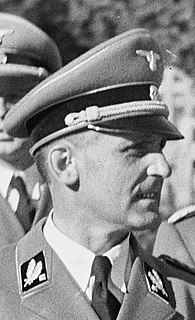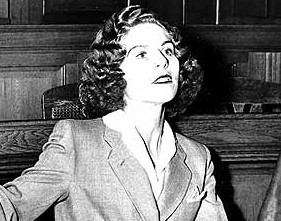
Reinhard Tristan Eugen Heydrich was a high-ranking German Nazi official during World War II, and a main architect of the Holocaust. He was an SS-Obergruppenführer und General der Polizei as well as chief of the Reich Main Security Office. He was also Stellvertretender Reichsprotektor of Bohemia and Moravia. Heydrich served as president of the International Criminal Police Commission and chaired the January 1942 Wannsee Conference, which formalised plans for the Final Solution to the Jewish Question—the deportation and genocide of all Jews in German-occupied Europe.

The Life of Emile Zola is a 1937 American biographical film about 19th-century French author Émile Zola, starring Paul Muni and directed by William Dieterle, a German emigré. It is notable as the second biographical film to win the Oscar for Best Picture. It premiered at the Los Angeles Carthay Circle Theatre to great success both critically and financially. Contemporary reviews ranked it as the best biographical film made up to that time. In 2000, it was selected for preservation in the United States National Film Registry by the Library of Congress as being "culturally, historically, or aesthetically significant".
Sicherheitsdienst, full title Sicherheitsdienst des Reichsführers-SS, or SD, was the intelligence agency of the SS and the Nazi Party in Nazi Germany. Originating in 1931, the organization was the first Nazi intelligence organization to be established and was considered a sister organization with the Gestapo through integration of SS members and operational procedures. Between 1933 and 1939, the SD was administered as an independent SS office, after which it was transferred to the authority of the Reich Main Security Office, as one of its seven departments/offices. Its first director, Reinhard Heydrich, intended for the SD to bring every single individual within the Third Reich's reach under "continuous supervision".

Kristallnacht or Reichskristallnacht, also referred to as the Night of Broken Glass, Reichspogromnacht[ˌʁaɪçs.poˈɡʁoːmnaχt] or simply Pogromnacht[poˈɡʁoːmnaχt](listen), and Novemberpogrome[noˈvɛmbɐpoɡʁoːmə](listen), was a pogrom against Jews throughout Nazi Germany on 9–10 November 1938, carried out by SA paramilitary forces and civilians. The German authorities looked on without intervening. The name Kristallnacht comes from the shards of broken glass that littered the streets after the windows of Jewish-owned stores, buildings, and synagogues were smashed.

Nacht und Nebel was a directive issued by Adolf Hitler on 7 December 1941 targeting political activists and resistance "helpers" in World War II to be imprisoned or killed, while the family and the population remained uncertain as to the fate or whereabouts of the Nazi state's alleged offender. Victims who disappeared in these "Night and Fog" actions were never heard from again.
The Reich Main Security Office was an organization subordinate to Heinrich Himmler in his dual capacities as Chef der Deutschen Polizei and Reichsführer-SS, the head of the Nazi Party's Schutzstaffel (SS). The organization's stated duty was to fight all "enemies of the Reich" inside and outside the borders of Nazi Germany.

Heinrich Müller was a German police official under both the Weimar Republic and Nazi Germany. He became chief of the Gestapo, the political secret state police of Nazi Germany, and was involved in the planning and execution of the Holocaust. He was known as "Gestapo Müller" to distinguish him from another SS general also named Heinrich Müller. He was last seen in the Führerbunker in Berlin on 1 May 1945 and remains the most senior figure of the Nazi regime who was never captured or confirmed to have died.

The Rosenstrasse protest was a collective street protest on Rosenstraße in Berlin during February and March 1943. This demonstration was initiated and sustained by the non-Jewish wives and relatives of Jewish men who had been arrested and targeted for deportation, based on the racial policy of Nazi Germany. The protests continued until the men being held were released. The Rosenstrasse protest was the only mass public demonstration by Germans in the Third Reich against the deportation of Jews.

Michael von Faulhaber was a Catholic Cardinal and Archbishop of Munich for 35 years, from 1917 to his death in 1952. Faulhaber was an opponent of the Nazi government and considered Nazi ideology incompatible with Christianity; but he also rejected the Weimar Republic as rooted in treason and opposed democratic government in general, favoring a Catholic monarchy. Faulhaber spoke out against some Nazi policies, but publicly recognized the Nazi government as legitimate, required Catholic clergy to remain loyal to the Nazi government, and maintained bridges between fascism and the Church. He ordained Joseph Ratzinger as a priest in 1951, and was the last surviving Cardinal appointed by Pope Benedict XV.
Christopher Robert Browning is an American historian, known best for his works on the Holocaust. Browning received his bachelor's degree from Oberlin College in 1968 and his doctorate from the University of Wisconsin–Madison in 1975. He taught at Pacific Lutheran University from 1974 to 1999, eventually becoming a Distinguished Professor. In 1999, he moved to the University of North Carolina at Chapel Hill to accept an appointment as Frank Porter Graham Professor of History. Browning was elected a Fellow of the American Academy of Arts and Sciences in 2006. Browning retired from teaching in Spring 2014.

Karl Rudolf Werner Best was a German Nazi, jurist, police chief, SS-Obergruppenführer and Nazi Party leader and theoretician from Darmstadt, Hesse. He was the first chief of Department 1 of the Gestapo, Nazi Germany's secret police, and initiated a registry of all Jews in Germany. As a deputy of SS-Obergruppenführer Reinhard Heydrich he organized the World War II SS-Einsatzgruppen paramilitary death squads that were responsible for mass killings.

The Nuremberg Laws were antisemitic and racial laws in Nazi Germany. They were enacted by the Reichstag on 15 September 1935, at a special meeting convened during the annual Nuremberg Rally of the Nazi Party (NSDAP). The two laws were the Law for the Protection of German Blood and German Honour, which forbade marriages and extramarital intercourse between Jews and Germans and the employment of German females under 45 in Jewish households; and the Reich Citizenship Law, which declared that only those of German or related blood were eligible to be Reich citizens; the remainder were classed as state subjects, without citizenship rights. A supplementary decree outlining the definition of who was Jewish was passed on 14 November, and the Reich Citizenship Law officially came into force on that date. The laws were expanded on 26 November 1935 to include Romani people. This supplementary decree defined Romanis as "enemies of the race-based state", the same category as Jews.

Hitler's Willing Executioners: Ordinary Germans and the Holocaust is a 1996 book by American writer Daniel Goldhagen, in which he argues that the vast majority of ordinary Germans were "willing executioners" in the Holocaust because of a unique and virulent "eliminationist antisemitism" in German political culture which had developed in the preceding centuries. Goldhagen argues that eliminationist antisemitism was the cornerstone of German national identity, was unique to Germany, and because of it ordinary German conscripts killed Jews willingly. Goldhagen asserts that this mentality grew out of medieval attitudes rooted in religion and was later secularized.

Stella Kübler-Isaacksohn was a German Jewish woman who collaborated with the Gestapo during World War II, exposing and denouncing Berlin's underground Jews.

Josef Albert Meisinger, also known as the "Butcher of Warsaw", was a SS functionary in Nazi Germany. He held a position in the Gestapo and was a member of the Nazi Party. During World War II Meisinger served as commander of Einsatzgruppe IV on Poland. From 1941 to 1945 he worked as liaison for the Gestapo at the German embassy in Tokyo. He was arrested in Japan in 1945, convicted of war crimes and was executed in Warsaw, Poland.
Ernst Moritz Hess was a baptized German Jew who served in the Imperial German Army during the First World War. He commanded the company of the Bavarian Reserve Infantry Regiment 16 in which Adolf Hitler served during the war. During the inter-war period he served as a judge before being forced out of office after the passing of the Nuremberg Laws by the Nazis in 1935, as he was classified as a "full-blooded Jew" due to his mother being Jewish, even though he was baptised a Protestant.
The Pope's Jews: The Vatican's Secret Plan to Save Jews from the Nazis is a 2012 book by the British author Gordon Thomas concerning the efforts of Pope Pius XII to protect Jews during the Nazi Holocaust. The Observer reported in 2013 that "Gordon Thomas, a Protestant, was given access to previously unpublished Vatican documents and tracked down victims, priests and others who had not told their stories before" and had uncovered "evidence on Pius XII's wartime efforts to save Jewish refugees".
Herbert Martin Hagen was an SS-Sturmbannführer of Nazi Germany.














